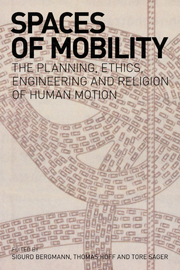Book contents
- Frontmatter
- Contents
- List of illustrations and tables
- Contributors
- Preface
- Acknowledgements
- 1 The beauty of speed or the cross of mobility? Introductory reflections on the aesth/ethics of space, justice and motion
- Part I
- Part II
- 5 The bodily basis of control in technically aided movement
- 6 What modes of moving do to me – reflections on technogenic processes of identification
- 7 Global vagabonds, place and the self: the existential dimension of mobility
- Part III
- Index
6 - What modes of moving do to me – reflections on technogenic processes of identification
from Part II
- Frontmatter
- Contents
- List of illustrations and tables
- Contributors
- Preface
- Acknowledgements
- 1 The beauty of speed or the cross of mobility? Introductory reflections on the aesth/ethics of space, justice and motion
- Part I
- Part II
- 5 The bodily basis of control in technically aided movement
- 6 What modes of moving do to me – reflections on technogenic processes of identification
- 7 Global vagabonds, place and the self: the existential dimension of mobility
- Part III
- Index
Summary
Introduction
This essay deals with an overlooked issue in the discourse of mobility and environmental ethics: what modes of moving do to me. I suggest that this issue makes more sense with regard to current research on ecopsychology, environmental psychology, postmodern theories, ecological feminism, ecotheology and the mobility discourse than the more common question: what are the best environmental consequences of our use of mobile machines? Starting from a social construction of technology or technosocial point of view (Bauchspies et al. 2006), according to which ‘technology is neither autonomous nor neutral, but dependent on particular social origins’ (Deane-Drummond 2004: 90), I suggest that discussions of the environmental ethical significance of mobile machines cannot be limited to their effects on the environment.
The main aim of this essay is to introduce the concept of technogenic and impure identification processes and to suggest that this concept can generate new important questions for environmental mobility ethics. I suggest that the idea of technogenic and impure identifications might serve as a starting-point for a new critical ethical endeavour that includes developing an understanding of a sustainable culture of automobility, along with generating new environmental awareness in this context, and a concept of environmental ethics that does not exclude relationships with machines.
- Type
- Chapter
- Information
- Spaces of MobilityThe Planning, Ethics, Engineering and Religion of Human Motion, pp. 125 - 154Publisher: Acumen PublishingPrint publication year: 2008



